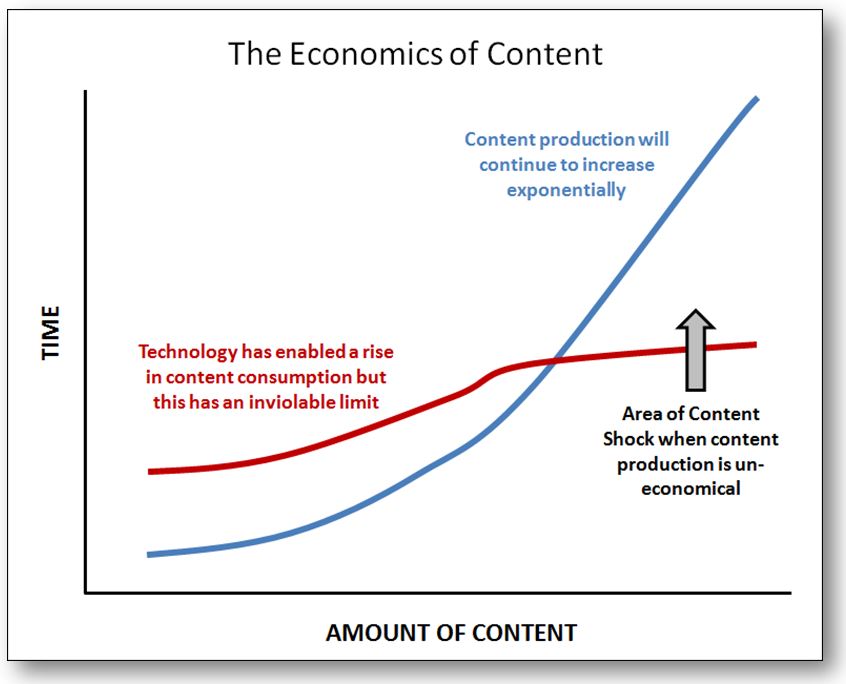- Home
- Blog
- Content Marketing Turning Content Shock Into an Opportunity
Turning Content Shock Into an Opportunity
-
 8 min. read
8 min. read
-
 Trevin Shirey
Trevin Shirey VP of Marketing
VP of Marketing
- Trevin serves as the VP of Marketing at WebFX. He has worked on over 450 marketing campaigns and has been building websites for over 25 years. His work has been featured by Search Engine Land, USA Today, Fast Company and Inc.
Earlier this year, Mark Shaefer wrote a blog post about why content marketing is not a sustainable strategy for businesses. His post dubbed the term “content shock” – what he believes will happen when the amount of content produces increases beyond the reading capacity of those on the Internet.

As more and more businesses invest in content marketing, one can’t help but wonder if this theory has some weight. Will the amount of blog posts, guides, and whitepapers available eventually grow beyond what our customers are capable of consuming?
Content marketing was “the next big thing”
If you’ve been interested in Internet marketing for a few years, by now you’re probably tired of hearing the phrase “the next big thing.” Last year, content marketing was the next big thing.
Before that, it was infographics. Before that, it was Pinterest. You get the idea.
The “next big thing” is now being adopted by brands immediately, to the point that it becomes an expected part of a business strategy mere months after its introduction. When Facebook Pages began to gain popularity in the late 2000s, and brands began adopting them as a crucial part of their online marketing strategy, it was hard to see how such a great tool would ever be less effective. Pages had incredible reach to fans, and Facebook gave businesses multiple ways to make money and increase their following.
Now, just a few years later, anonymous sources at Facebook are reporting that brands only have a 1 to 2 percent chance of showing up in a user’s feed. Unless they pay, of course. It seems like each and every “next big thing” is more temporary than we’d like to admit.
Facebook is dramatically crippling the ability for brands to reach even their most engaged fans by limiting the reach of Page posts, which could signify the end of its reliability as a marketing method. Could the same thing happen to content marketing?
Does marketing ruin everything?
The above clip from Gary Vaynerchuk offers the theory that “marketers ruin everything.” Remember how exciting Groupon used to seem? Do you even care about “daily deal” websites now that hundreds of them exist in every market imaginable?
The content shock theory was created based on the idea of the amount of content produced eventually exceeding the amount of time available to absorb it. But this idea of marketers eventually over-utilizing each and every “next big thing” until it’s no longer viable or interesting could present yet another threat to content marketing. Is content marketing really such a good idea if everyone is doing it?
At some point, will consumers not be able to sort through the bad to find the good, and just stop caring? Will the same thing that happened to those once-appealing daily deal websites happen to the content brands are working so hard to create? Will we all eventually just start tuning out content the same way we do commercials?!
The theory of content scorn
Instead of content shock, our biggest threat may actually be content scorn.
Eventually, the problem may not be that there’s too much content to absorb – but that consumers just don’t want to absorb it, because they know they’re being marketed to.

Marketing and advertising have evolved since the beginning of the Internet. When banner and pop-up ads were brand new, you may have clicked on a few of them. Having never been exposed to them before, your initial reaction was probably something like curiosity or even genuine interest.
However, a few months or years later, those ads probably lost their effect on you, because everyone was using them, and by then you knew they were just pushing you to buy something. This is what could happen with content marketing – at least, to the companies who are using it simply because they think it will make them money. So how can brands make their content stand out in a saturated field and avoid the potential loss of interest?
That may be the million dollar question of 2014, and we’re not even four months in. Whether or not you believe in content shock or scorn, believing that you can just keep churning out content that will eventually get you customers or links unfortunately won’t get you anywhere. Nor will producing content solely for the sake of producing content.
However, I believe that as the content marketing “fad” dies out and customers grow more aware of its purpose, this can actually provide an opportunity for savvy businesses.
Turning content shock into an opportunity
Content marketing did exist before it became a trend. For years, there were plenty of companies (including many of our clients!) who were blogging, creating videos, publishing case studies, and just generally doing whatever they could to produce material that would help their customers. I think that’s the key: those businesses were focused on helping, not promoting or growing or maximizing or link building.
It all comes down to intent. When the brands who are playing the content marketing game for the sake of exposure, money, or links get tired of it, and when their half-hearted efforts wear out or overwhelm consumers, those who keep at it because their intent is to help, guide, or delight, not sell, will stand out. Content shock could and probably will happen – but when the trend fades away and those who weren’t serious about it move on, those who continue doing it because they know it has a purpose will have an even better chance at getting noticed.

This doesn’t mean that your business will stand out because you’ll be the only one left doing it.
Considering the number of brands still posting on Facebook daily despite the drastic decrease in organic reach, and the cyclical nature of the Internet (have you noticed pop-ups are back?), it’s likely that many companies will keep doing content marketing, or that there will be a second “wave” in which it becomes trendy again. Also, as I mentioned, the theory of content scorn means that customers will become aware of content produced with the sole purpose of selling. So to turn this situation into an opportunity, the key is to create content that adds value.
Writers often ask themselves “is this necessary?” or “does this help my story?” when they’re editing. If the answer is “no,” they revise, edit, and rewrite. Businesses should ask themselves these same kinds of questions when they’re producing content, like:
- Is this valuable?
- Will this help my customers?
- Is there a need for this kind of content?
- How can I make this different or unique?
- Has someone else already done this better than me?

Answering that last question is tough. But if I didn’t ask myself that, I’d be posting on the WebFX blog every day instead of once or twice a week. 🙂 Doing only what is truly valuable is the key.
Instead of writing a 400 word blog post about trends in your industry solely because you want to put a link to a new product at the end, write an 800 word blog post about those trends because you are passionate about them and think your customers will be delighted by it. Is there a need for another blog post on a news item if all you want to do is mention the apparent relevance of your brand? If not, don’t post it.
Doing what hasn’t been done, and doing it because you want to add value, is how you can turn this situation into an opportunity for your brand to stand out. Honesty, the desire to help, and genuine kindness never go out of style. Think about (or ask) what your customers or leads want, and create content that will meet their needs or solve a problem, instead of creating content because you think it might make them buy from you. When customers begin to recognize sales pitches not-so-cleverly disguised as a blog post, they’ll find your approach refreshing and worth following.
Content marketing may have been the “next big thing,” but that doesn’t mean it won’t work for you once it is no longer popular. While the end goal of marketing activities is likely “to make money,” when it comes to content, you have to put the needs of your customers before your own. By doing that, you’ll stand out by creating content that people want to consume, even months and years after the trend is gone.
-
 Trevin serves as the VP of Marketing at WebFX. He has worked on over 450 marketing campaigns and has been building websites for over 25 years. His work has been featured by Search Engine Land, USA Today, Fast Company and Inc.
Trevin serves as the VP of Marketing at WebFX. He has worked on over 450 marketing campaigns and has been building websites for over 25 years. His work has been featured by Search Engine Land, USA Today, Fast Company and Inc. -

WebFX is a full-service marketing agency with 1,100+ client reviews and a 4.9-star rating on Clutch! Find out how our expert team and revenue-accelerating tech can drive results for you! Learn more
Try our free Marketing Calculator
Craft a tailored online marketing strategy! Utilize our free Internet marketing calculator for a custom plan based on your location, reach, timeframe, and budget.
Plan Your Marketing Budget

Looking for More?
Get expert ideas, industry updates, case studies, and more straight to your inbox to help you level up and get ahead.
"*" indicates required fields
Try our free Marketing Calculator
Craft a tailored online marketing strategy! Utilize our free Internet marketing calculator for a custom plan based on your location, reach, timeframe, and budget.
Plan Your Marketing Budget





